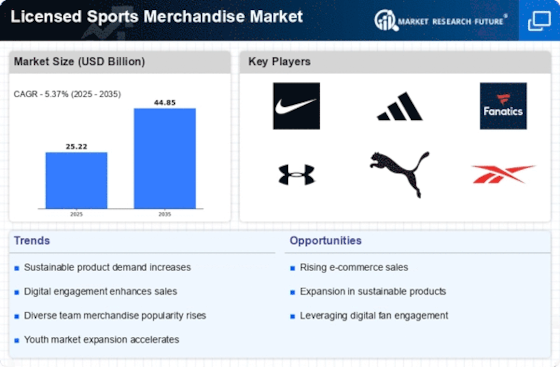Top Industry Leaders in the Licensed Sports Merchandise Market

The competitive landscape of the licensed sports merchandise market is prominently influenced by key players such as Nike Inc., Adidas AG, Fanatics Inc., VF Corporation, and Puma SE. These industry leaders wield substantial market share driven by their exclusive licensing agreements with major sports leagues and teams, extensive product portfolios, and global brand recognition. Key strategies adopted by these players include continuous product innovation, strategic partnerships with sports organizations, and targeted marketing initiatives to maintain market dominance and expand their consumer base.
Market share analysis in the licensed sports merchandise segment is influenced by critical factors such as the strength of licensing agreements, brand appeal, and the ability to offer a diverse range of products ranging from apparel to accessories. Pricing strategies play a pivotal role, with companies providing licensed sports merchandise across various price points to cater to diverse consumer segments. Establishing strong partnerships with retailers, both physical and online, is essential for market share, ensuring widespread product accessibility and visibility.
While established players dominate the licensed sports merchandise market, new and emerging companies are entering the arena with innovative approaches. These entrants often focus on niche sports, unique design concepts, and collaborations with emerging athletes to carve a niche for themselves. The agility of these emerging companies allows them to swiftly adapt to changing sports trends, challenging the market dominance of established brands and contributing to the overall diversity of the market.
Industry news within the licensed sports merchandise market frequently highlights exclusive licensing deals, collaborations, and evolving consumer trends. Companies regularly secure partnerships with individual athletes, sports leagues, and major sporting events to enhance brand visibility and exclusivity. Collaborations with fashion designers and celebrities are common to broaden the appeal of sports merchandise beyond traditional fanbases. Regulatory updates related to intellectual property rights and licensing regulations shape industry dynamics, prompting companies to navigate legal complexities in their licensing agreements.
Current trends in company investments within the licensed sports merchandise market reflect a notable focus on digital platforms, e-commerce, and sustainability. Companies allocate resources to enhance their online presence, develop user-friendly e-commerce platforms, and leverage digital marketing strategies. Strategic marketing initiatives, including social media campaigns and influencer partnerships, are employed to strengthen brand presence and resonate with the target consumer demographic. Investments in sustainable practices, such as eco-friendly materials and responsible manufacturing processes, align with the growing consumer demand for ethical and environmentally conscious products.
The overall competitive scenario in the licensed sports merchandise market remains dynamic, with companies navigating evolving sports trends, consumer preferences, and digital transformations. Established players face the challenge of maintaining and enhancing their licensing agreements while adapting to the changing landscape of e-commerce and sustainability expectations. The competition is expected to intensify as new entrants gain recognition, introducing fresh perspectives and challenging the market share of established brands. In this environment, adaptability, responsiveness to sports trends, and a commitment to innovation and sustainability will be crucial for companies to maintain and enhance their competitive positions in the licensed sports merchandise market.
Industry News and Investment Landscape:
- Recent purchases, such as Fanatics' acquisition of Fanatics Europe, demonstrate the market's trend toward consolidation.
- Growing expenditures in data analytics, customization platforms, and technology demonstrate an emphasis on long-term planning.
- The commercial potential is further expanded by the growing global fan communities and the growing popularity of esports.
Key Companies in The Licensed Sports Merchandise Market Includes –
- Quiksilver Inc.
- Puma SE
- Li Ning
- Fanatics Inc.
- Adidas AG
- Sports Direct International plc
- G-III Apparel Group
- Knights Apparel Inc.
- Ralph Lauren Corporation
- Nike Inc.


